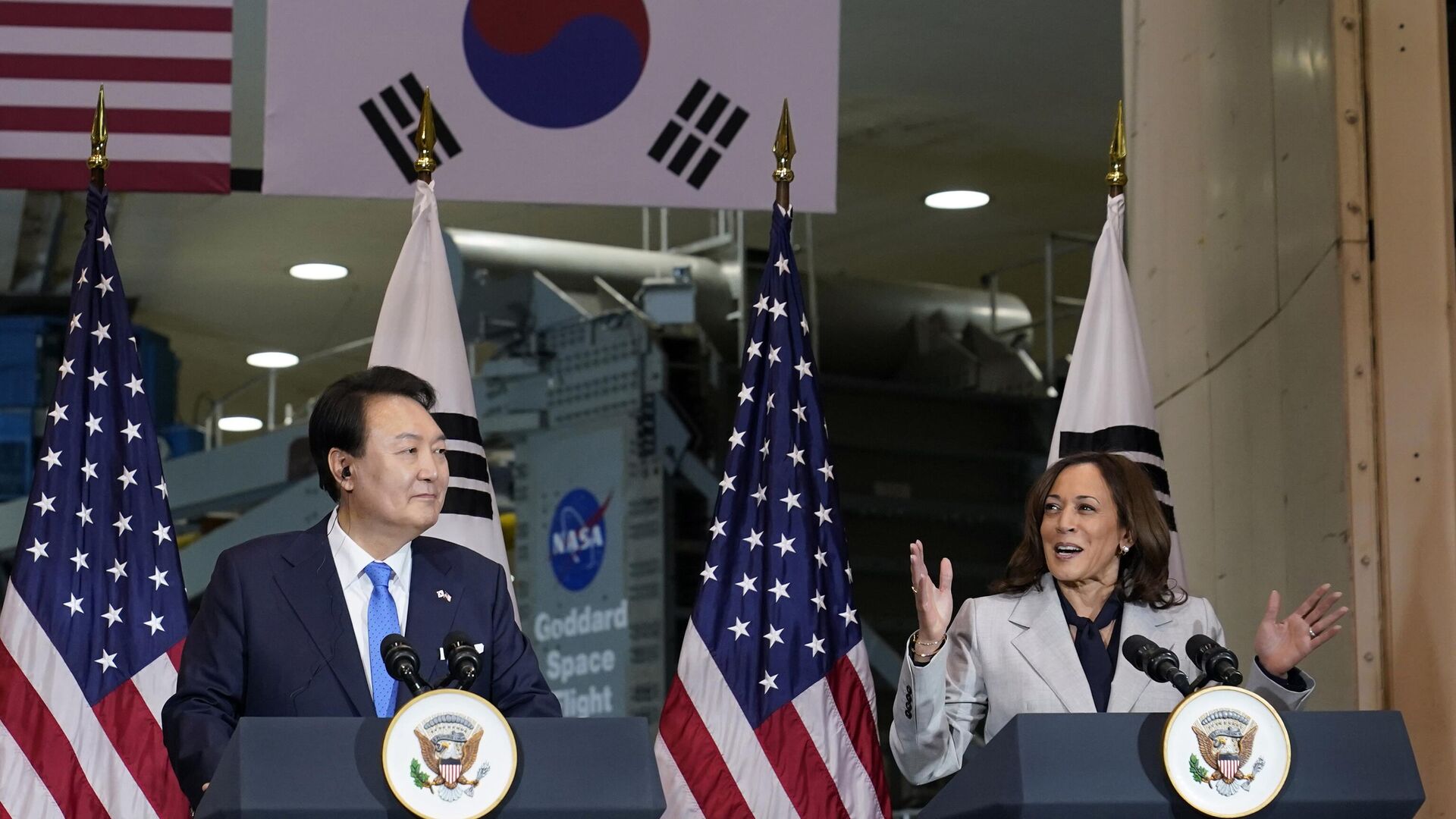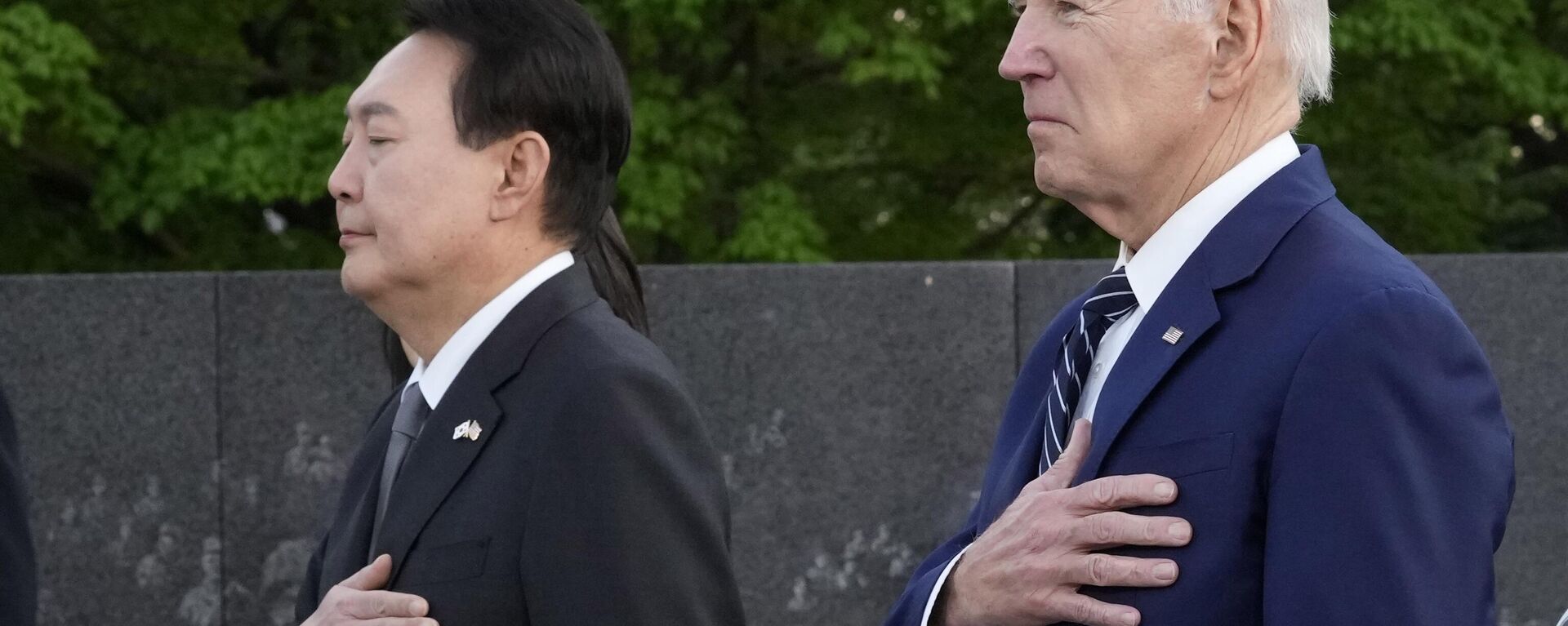https://sputnikglobe.com/20230426/south-korean-leaders-us-visit-sets-stage-for-new-cold-war-in-pacific-1109849735.html
South Korean Leader's US Visit Sets Stage for New Cold War in Pacific
South Korean Leader's US Visit Sets Stage for New Cold War in Pacific
Sputnik International
The election of right-wing South Korean President Yoon Suk-yeol has once again frozen relations with the north. Greg Elich said Seoul had taken Washington's side in the broader new Cold War.
2023-04-26T17:02+0000
2023-04-26T17:02+0000
2023-04-26T17:02+0000
asia
korea policy institute
gregory elich
yoon suk yeol
joe biden
china
russia
north korea
south korea
pacific
https://cdn1.img.sputnikglobe.com/img/07e7/04/1a/1109842462_0:160:3072:1888_1920x0_80_0_0_63b53e9f9b11da9615aa1f36cfed5705.jpg
The South Korean presidential state visit to the US is intended to cement agreement on ratcheting up the "new Cold War" with China, North Korea and Russia, says a regional expert.Yoon Suk-yeol arrived in Washington DC on Tuesday for talks with US President Joe Biden. Officials said the focus of the discussions was North Korea's nuclear weapon and missile programmes, now back in motion after a deal brokered by former US leader Donald Trump collapsed after the US resumed its twice-yearly joint military exercises with the south.Greg Elich told Sputnik that Yoon's visit was "about overt military aggression, alliance building and threat signalling," not the "stalking horse" of Pyongyang's missile tests.The Asia expert pointed out that Yoon had recently angered Beijing by weighing in on Taiwan's claim to independence, describing it as "a global issue that goes beyond the regional level."At a recent meeting between Asian governments and NATO officials, the South Korean deputy foreign minister said he welcomed the US-led military bloc's "leadership" in the pacific, adding that "We hope to work more closely with NATO.""The US wants South Korea to provide direct military assistance to Ukraine, including howitzers and military shells," Elich noted, pointing to Seoul's agreement to supply the US with half a million artillery shells on credit — ostensibly on the basis that they will not be re-exported to Ukraine. "This is about South Korea saying that it's not adhering to its policy of not becoming directly involved with a war in Ukraine while actually doing so."Turning to the tensions between the Republic of Korea (RoK) and the northern Democratic People's Republic of Korea (DPRK), the commentator did not believe the US would back Yoon's recent threat to develop his own nuclear weapons.The DPRK's moratorium on nuclear weapon and missile tests was dependent on Trump's pledge to halt bi-annual US-South Korean military exercises along the Demilitarised Zone border that partitions the Korean peninsula."But on the Korean Peninsula as well, the US has flown this year in nuclear capable bombers," he added. "this is the largest exercises in several years, basically trying to keep tensions ramped up against North Korea."For more in-depth analysis, follow our Sputnik Radio show By Any Means Necessary.
https://sputnikglobe.com/20230426/s-korea-us-talks-seeking-to-reaffirm-ironclad-ties-amid-fallout-from-pentagon-leaks-1109842930.html
china
russia
north korea
south korea
pacific
Sputnik International
feedback@sputniknews.com
+74956456601
MIA „Rossiya Segodnya“
2023
James Tweedie
https://cdn1.img.sputnikglobe.com/img/07e4/08/1c/1080307270_0:3:397:400_100x100_80_0_0_7777393b9b18802f2e3c5eaa9cbcc612.png
James Tweedie
https://cdn1.img.sputnikglobe.com/img/07e4/08/1c/1080307270_0:3:397:400_100x100_80_0_0_7777393b9b18802f2e3c5eaa9cbcc612.png
News
en_EN
Sputnik International
feedback@sputniknews.com
+74956456601
MIA „Rossiya Segodnya“
Sputnik International
feedback@sputniknews.com
+74956456601
MIA „Rossiya Segodnya“
James Tweedie
https://cdn1.img.sputnikglobe.com/img/07e4/08/1c/1080307270_0:3:397:400_100x100_80_0_0_7777393b9b18802f2e3c5eaa9cbcc612.png
south korea, republic of korea, yoon suk-yeol, joe biden, us, china, russia, dprk, cold war
south korea, republic of korea, yoon suk-yeol, joe biden, us, china, russia, dprk, cold war
South Korean Leader's US Visit Sets Stage for New Cold War in Pacific
The election of right-wing South Korean President Yoon Suk-yeol has once again frozen relations with the north. Greg Elich, Korea Policy Institute board member and a contributor to the collection Sanctions as War: Anti-Imperialist Perspectives on American Geo-Economic Strategy, said Seoul had taken Washington's side in the broader new Cold War.
The South Korean presidential state visit to the US is intended to cement agreement on ratcheting up the "new Cold War" with China, North Korea and Russia, says a regional expert.
Yoon Suk-yeol arrived in Washington DC on Tuesday for talks with US President Joe Biden.
Officials said the focus of the discussions was North Korea's nuclear weapon and missile programmes, now back in motion after a deal brokered by former US leader Donald Trump collapsed after the US resumed its twice-yearly joint military exercises with the south.
Greg Elich told Sputnik that Yoon's visit was "about overt military aggression, alliance building and threat signalling," not the "stalking horse" of Pyongyang's missile tests.
Yoon "repeatedly made it clear that he wants to subordinate South Korea's foreign policy to the US Indo-Pacific strategy," Elich said. "Basically, he's adopted the role of vassal state. There's no critical examination of the US role in the Asia Pacific. He just wants to strengthen that alliance."
The Asia expert pointed out that Yoon had recently angered Beijing by weighing in on Taiwan's claim to independence, describing it as "a global issue that goes beyond the regional level."
"Taiwan is basically an internal Chinese affair. It's the one-China policy that most of the nations in the world, including the United States, recognize that Taiwan is an inalienable part of China," Elich said. "This is Yoon's way of going along with US policy lately of trying to internationalize and make Taiwan a global issue rather than internal affairs."
At a recent meeting between Asian governments and NATO officials, the South Korean deputy foreign minister said he welcomed the US-led military bloc's "leadership" in the pacific, adding that "We hope to work more closely with NATO."
"The US wants South Korea to provide direct military assistance to Ukraine, including howitzers and military shells," Elich noted, pointing to Seoul's agreement to supply the US with half a million artillery shells on credit — ostensibly on the basis that they will not be re-exported to Ukraine. "This is about South Korea saying that it's not adhering to its policy of not becoming directly involved with a war in Ukraine while actually doing so."
Turning to the tensions between the Republic of Korea (RoK) and the northern Democratic People's Republic of Korea (DPRK), the commentator did not believe the US would back Yoon's recent threat to develop his own nuclear weapons.
"But one of the key things that they will be discussing this week is the US nuclear umbrella over South Korea and what circumstances the US would deploy nuclear weapons against North Korea," Elich said. "Both the US and and Yoon want to take a more aggressive stance against North Korea. They're doing everything to ramp up tensions."
The DPRK's moratorium on nuclear weapon and missile tests was dependent on Trump's pledge to halt bi-annual US-South Korean military exercises along the Demilitarised Zone border that partitions the Korean peninsula.
"There's been a tremendous ramp-up in both the size and frequency of military exercises in South Korea, and not just in South Korea," Elich siad, also mentioning the Cobra Gold wargames in Thailand. "That was directed to basically China because it was all about, quote, keeping the Indo-Pacific free and open. The standard coded language for the China campaign."
"But on the Korean Peninsula as well, the US has flown this year in nuclear capable bombers," he added. "this is the largest exercises in several years, basically trying to keep tensions ramped up against North Korea."
For more in-depth analysis, follow our Sputnik Radio show By Any Means Necessary. 



